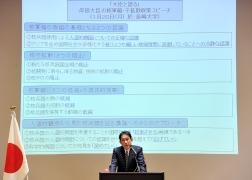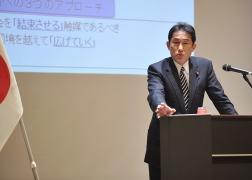Speeches by the Foreign Minister KAMIKAWA Yoko
Nuclear Disarmament and Non-proliferation Policy Speech (Summary)
by H.E. Mr. Fumio Kishida, Minister for Foreign Affairs of Japan,
at "Dialogue with Foreign Minister Kishida"
(Nagasaki University, January 20, 2014)
January 20, 2014


1. Introduction
- Japan will contribute even more actively to securing the peace, stability and prosperity of the international community as a “Pro-active Contributor to Peace” based on the principle of international cooperation.
2. Global Situation concerning Nuclear Weapons
- In the post-Cold War era, the number of nuclear weapons has decreased and the role of nuclear weapons has significantly reduced.
- On the other hand, the current situation is such that (1) the progress of nuclear disarmament is insufficient and also that (2) the problem of nuclear-weapons proliferation is becoming more serious.
(1) Regarding nuclear disarmament, there are reportedly still over 17,000 nuclear weapons worldwide. It has been observed that there is a continued lack of transparency in the nuclear force build-up.
(2) Regarding the issue of proliferation of nuclear weapons, concerns related to proliferation are becoming more serious, including nuclear development by North Korea, the Iranian nuclear issue, and the proliferation of nuclear-weapons-related sensitive materials and technologies. In this way, the world’s nuclear risks are diversifying. - Japan is of the view that it must take the lead in international efforts of nuclear disarmament and non-proliferation based on the following two notions: (1) a clear understanding of the humanitarian aspects of the use of nuclear weapons and (2) an objective assessment of the reality of today’s international community, which is facing increasingly diversifying nuclear risks.
- In order to achieve the goal of “a world free of nuclear weapons,” we must advance both nuclear disarmament and non-proliferation together. This is embodied in the Treaty on the Non-Proliferation of Nuclear Weapons (NPT).
3. Nuclear Non-proliferation (“Three Preventions”)
(1) Prevention of the Emergence of new nuclear weapon states
- Preventing the emergence of new nuclear weapon states is one of the most important pillars of Japan’s non-proliferation policy.
- North Korea’s nuclear and missile developments pose a grave threat to Japan. Japan, in coordination with the countries concerned, such as the United States (U.S.) and the Republic of Korea, strongly urges North Korea to take concrete actions toward its denuclearization and continues to urge the United Nations (UN) Member States to stringently implement relevant UN Security Council Resolutions regarding North Korea. To maintain readiness against provocations by North Korea, we must make ceaseless efforts to maintain and strengthen the deterrent capabilities of the Japan-U.S. Alliance.
- The Iranian nuclear issue is also a matter of concern. When I visited Tehran, I made some concrete proposals, such as for Iran to ratify the International Atomic Energy Agency (IAEA) Additional Protocol and to ratify the Comprehensive Nuclear-Test-Ban Treaty (CTBT) at an early date. Japan will, in coordination with the international community, continue to be actively engaged in international efforts to achieve a comprehensive resolution of the issue.
- At the same time, the IAEA safeguards are indispensible to reinforce the international non-proliferation regime. With its longstanding knowledge and experience, Japan will strive to make a concrete contribution to strengthen the implementation system of the safeguards.
(2) Prevention of the Proliferation of Nuclear-Weapons-Related Materials and Technologies
- It is important to implement export control for the prevention of procurement of nuclear-related materials and technologies by parties pursuing the possession of nuclear weapons.
- In recent years, Asian countries have been acquiring the capacity to produce materials and technologies that could be diverted to the development of nuclear weapons as well as missiles as a means of delivery. Meanwhile, illegal procurement activities are becoming increasingly sophisticated. Therefore, there is an increased risk that these countries would export such materials and technologies to countries of concern, without recognizing that they could be diverted to nuclear weapons development.
- The strengthening of export controls fosters confidence in the reliability of trade or investment partners. Export controls thereby create a favorable environment for further economic growth rather than impeding trade and investment. Japan will seek understanding of the countries concerned on this point.
(3) Prevention of Nuclear Terrorism
- It is important to prevent “nuclear terrorism,” which is an act of terror by non-state actors, such as terrorist organizations.
- Strengthening nuclear security is important from the following three perspectives: (1) Japan’s national security, (2) maintaining public order, and (3) promoting the peaceful use of nuclear energy.
- Efforts by many countries to build and strengthen their capacity to counter nuclear terrorism will promote confidence building among nations in international security. To strengthen nuclear security systems, it is of value to firmly establish the required rules and norms and to share good practices and learn from each other regarding measures to protect against nuclear terrorism among countries.
- Through various international fora including the Third Nuclear Security Summit to be held in The Hague in March this year, Japan, as one of the countries with the most advanced nuclear technology, will actively contribute to strengthening nuclear security in Asia and the world.
4. Nuclear Disarmament (“Three Reductions”)
(1) Reduction of the Number of Nuclear Weapons
- To achieve the goal of “a world free of nuclear weapons,” it is important that all NPT nuclear-weapon States fulfill their obligation under the NPT to pursue nuclear disarmament negotiations in good faith. Nuclear disarmament negotiations between the U.S. and Russia must develop into multilateral negotiations with other states possessing nuclear weapons including the United Kingdom, France and China.
- Japan calls for at least not increasing nuclear forces from their present levels.
- Increasing transparency of nuclear forces is essential.
(2) Reduction of the Role of Nuclear Weapons
- It is vital to further narrow and to limit the role and the use of nuclear weapons in national security policies and military doctrines of the countries possessing nuclear weapons.
- Japan calls upon the NPT nuclear-weapon States to assure that non-nuclear-weapon States complying with their non-proliferation obligations under the NPT will not use or threaten the use of nuclear weapons.
- States holding nuclear weapons must review their deployment of nuclear weapons so that their deployment postures are consistent with their declared policies.
(3) Reduction of the Incentive for Possession of Nuclear Weapons
- It is necessary to reduce the motivation and incentive to develop and possess nuclear weapons.
- Reducing the role of nuclear weapons in political aspects will lead to a decline in incentives for additional countries to obtain nuclear weapons. Japan will make efforts to spread the understanding throughout the international community that the possession of nuclear weapons against international norms has a negative effect on a country’s position and reputation.
- It is important to foster trust through regional stabilization and the resolution of regional disputes.
5. Discussions on Nuclear Weapons from a Humanitarian Point of View
- Discussion of nuclear weapons from a humanitarian point of view is an important factor which the Government of Japan has long emphasized together with an objective assessment of the severe security environment.
- It is Japan’s mission, as the only country to have suffered atomic bombings, to continue to convey the tragedies of the use of atomic weapons in Hiroshima and Nagasaki across generations and borders.
- It is important to hold a universal and open discussion concerning this issue. Japan is going to call on the international community to acknowledge the importance of this issue based on the following three approaches:
(1) Considering the humanitarian aspect of nuclear weapons should be a catalyst for uniting the international community.
(2) It is necessary to spread awareness of the humanitarian aspect of nuclear weapons across generations and borders.
(3) It is also important to deepen our knowledge about its scientific aspects. - At the NPDI Ministerial Meeting to be held in Hiroshima this April, along with having foreign ministers from the participating countries see directly the realities of the bombing, Japan intends to hold substantive discussions, including on the humanitarian aspect of nuclear weapons, and to present useful proposals to the 3rd Session of the Preparatory Committee for the 2015 NPT Review Conference.
6. Conclusion
- In nuclear disarmament and non-proliferation efforts, it is essential to begin with a clear understanding of the humanitarian aspect of nuclear weapons and to steadily build up realistic and practical efforts based on objective assessment of the reality of the immediate nuclear risks in a severe security environment. This is the shortest path to “a world free of nuclear weapons.”
- In 2015, it will be 70 years since the atomic bomb was dropped here in Nagasaki. It is my sincere desire that the stated measures for the “Three Preventions” and the “Three Reductions” will become one great step toward the success of the next NPT Review Conference in the year 2015 and toward “a world free of nuclear weapons”.

